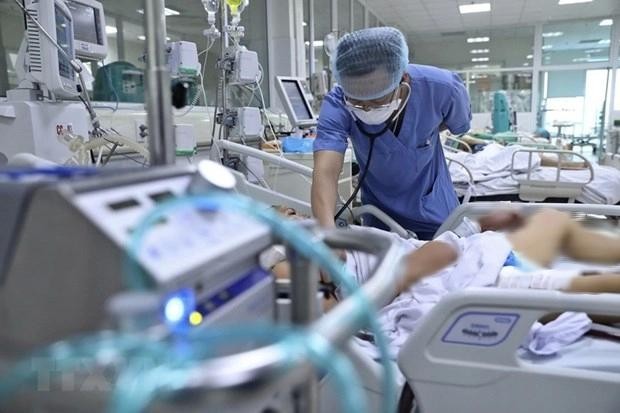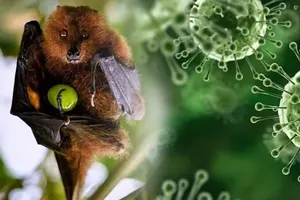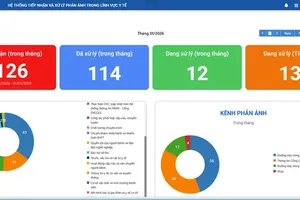
On April 6, the HCMC Department of Health reported a confirmed case of A/H9N2 influenza undergoing isolation and treatment at HCMC Hospital for Tropical Diseases. The patient, a 37-year-old male construction worker from Chau Thanh District, Tien Giang Province, was transferred from Military Hospital 120 in My Tho City, Tien Giang Province, to HCMC Hospital for Tropical Diseases for treatment on March 16.
Before seeking medical attention and treatment, the patient resided and worked at his place of residence. He had not received vaccinations for influenza or Covid-19. Opposite the patient's house lives his sister and brother-in-law, who are directly involved in slaughtering and trading poultry (including chickens, ducks, and field mice). However, the patient did not have direct contact with poultry. The patient's household also raises two geese for egg-laying purposes for family consumption, with no eggs being supplied to the outside. As of now, the health condition of individuals in the patient's sister's and brother-in-law's households remains robust, and there have been no reports of poultry deaths or abnormal symptoms at these locations.
On March 10, the patient started experiencing symptoms of fever and occasionally self-medicated. By the morning of March 16, the patient complained of pain in both legs and abdominal swelling, prompting his relatives to take him to Military Hospital 120 for examination. There, doctors diagnosed the patient with liver fibrosis and advised him to seek further examination and treatment at HCMC Hospital for Tropical Diseases.
On March 16, at 1:30 p.m., the patient was admitted to the Intensive Care and Toxicology Unit for Adults at HCMC Hospital for Tropical Diseases with the diagnosis including gastrointestinal bleeding stemming from a peptic ulcer, accompanied by alcoholic liver fibrosis and monitoring for septicemia.
While undergoing treatment, the patient developed pneumonia with diffuse alveolar and interstitial damage visible on X-ray in both lung fields. Nasopharyngeal swabs were taken for PCR testing for influenza viruses A and B. As respiratory failure worsened gradually, the patient was intubated and placed on mechanical ventilation.
On March 22, the patient tested positive for influenza A and negative for influenza B in the first nasopharyngeal swab test, but the strain could not be identified.
On March 26, the patient underwent a chest X-ray examination, which showed no improvement in bilateral lung tissue damage. A second nasopharyngeal swab sample was taken for PCR testing for influenza A and B viruses, and treatment continued.
On April 1, the Laboratory Department of HCMC Hospital for Tropical Diseases, in collaboration with the Oxford University Clinical Research Unit (OUCRU), successfully decoded the genetic sequence identifying the patient infected with the A/H9N2 influenza virus.
Currently, the patient remains under treatment in the negative-pressure isolation ward of the Intensive Care and Toxicology Unit for Adults, diagnosed with septicemia secondary to pneumonia, influenza A, fungal infection, complications of respiratory failure, pulmonary hemorrhage, stable abdominal hemorrhage, gastrointestinal bleeding, acute kidney injury, alcoholic liver fibrosis, and under surveillance for hepatocellular carcinoma.
As of now, no illnesses have been reported among individuals who have had contact with the patient.
In light of the situation, the HCMC Department of Health has instructed the HCMC Hospital for Tropical Diseases to rigorously enforce isolation, treatment, and patient care following the Ministry of Health's guidelines on avian influenza and the infection control department to closely monitor the health of healthcare workers who have attended to the patient (all staff in contact with the patient upon admission are equipped with proper personal protective gear as per regulations).
The Department of Health has directed the HCMC Center for Disease Control to report to the Pasteur Institute in HCMC and coordinate with the Center for Disease Control of Tien Giang Province to continue epidemiological investigations, especially regarding the patient's travel history and contacts, to swiftly prevent the risk of community transmission. Especially, it must monitor and guide the seven individuals who had close contact with the patient in Tien Giang Province to self-monitor their health at home, disinfect their entire households, and sanitize all personal belongings of the patient.
This marks Vietnam's first recorded case of A/H9N2 influenza to date. Previously, in March 2024, one fatality was attributed to A/H5N1 influenza in Khanh Hoa Province. From 2015 onwards, the Pacific region has reported 98 cases of A/H9N2 influenza, with two fatalities. Both fatalities had underlying health conditions, with 96 cases reported in China and two cases in Cambodia. Presently, there is no evidence indicating human-to-human transmission of A/H9N2 influenza.
Globally, since late 2023, the situation regarding avian influenza in animals has become increasingly complex. Not only have there been multiple outbreaks of avian flu in poultry across all regions, but there has also been a rising trend of transmission to mammals. In the US, sporadic cases of A/H5N1 influenza have been reported, transmitted from livestock in various states. In Asia, there have been ongoing outbreaks of avian flu caused by various strains of A influenza virus, including H5N1, H5N6, H5N8, H3N2, H9N2, and H10N3. Some countries bordering Vietnam continue to report cases of avian influenza in humans, involving strains such as H5N1 and H9N2.
























